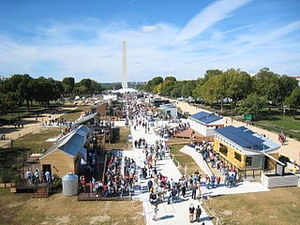
The U.S. Department of Energy'sW Solar Decathlon is a competitive program in which teams of college students compete to think of, create and operate solar-powered houses. These houses must be good-looking, energy-efficient and cost-effective as they will be judged for the program. The team that builds the best houses, based on energy use/consumption, great design and best looking for the consumers wins the Solar Decathlon. The competition allows visitors to look at the houses built for free and during certain hours to see how they can make their own homes more energy-efficient, more environmentally friendly or to just make their bills cheaper.
The first Solar Decathlon was held in 2002; the competition has since occurred biennially in 2005, 2007, 2009, and 2011. The next Solar Decathlon will be on October 3rd-13th, 2013, at Orange County Great Park in Irvine, California..[1]
History[edit | edit source]
The Solar Decathlon has been going strong since 2002 and in only the first ten years of it's creation, it influenced many people to try to establish a more energy-efficient based homes for the success and sustainability of the future. In the beginning, only fourteen different school-based teams competed in the Solar Decathlon and as of 2012, over ninety teams have competed. The Solar Decathlon doesn't have a long history, but it is growing in popularity as the years and publicity increase.
- The first Solar Decathlon took place at the National Mall in Washington DC on September 19th—October 6th, 2002, where fourteen teams competed from the US and Puerto Rico. The University of Colorado won.
- The second Solar Decathlon took place at the National Mall again on October 6th—16th, 2005, three years after the first Solar Decathlon. Eighteen teams from the US, Spain and Canada all competed. The University of Colorado won again.
- The third Solar Decathlon took place at the National Mall again on October 12th—20th, 2007. This was the Solar Decathlon that created the biennial pattern, continuing on the previous two years before. Twenty teams competed this time from the US, Canada, Spain, and for the first time, Germany. Germany's team, Technische Universität Darmstadt won.
- The fourth Solar Decathlon took place at the National Mall like usual on October 8th—18th, 2009. Just like in 2007, twenty teams from the US, Canada, Spain and Germany competed and just like the University of Colorado, the Germany team won for second time.
- The fifth Solar Decathlon again took place at the National Mall on Sept. 23–Oct. 2, 2011. Only nineteen teams from the US, Canada, China, Belgium and New Zealand competed in this competition. The University of Maryland won.[2]
Purpose and impact[edit | edit source]
The purpose of the Solar Decathlon was simple, but the impact it created is as great as it was imagined to be.
Purpose[edit | edit source]
The Solar Decathlon:
- Teaches the community and the students who build the houses about sustainable living and cost-saving, energy-efficient methods.
- Shows the public what renewable energy can do for the homes when they attempt to create a better home with more energy-efficient appliances and methods.
- Allows the students to learn to become better workers for the future workforce.
The Impact[edit | edit source]
The Solar Decathlon:
- Had 92 different teams compete to create solar-powered, energy-efficient houses.
- Created worldwide fame for teaching sustainable living and good work ethics to thousands of students.
- Affected the lives of 15,000 collegiate participants.
- Invited schools in the Washington DC area from grades K-12 to learn about sustainable living on field trips.[3]
Participants[edit | edit source]
Teams for 2013[edit | edit source]
The 2013 Solar Decathlon teams include:
- Arizona State University and The University of New Mexico
- Czech Republic: Czech Technical University
- Kentucky/Indiana: University of Louisville, Ball State University and University of Kentucky
- Middlebury College
- Missouri University of Science and Technology
- Norwich University
- Santa Clara University
- Southern California Institute of Architecture and California Institute of Technology
- Stanford University
- Stevens Institute of Technology
- Team Alberta: University of Calgary
- Team Austria: Vienna University of Technology
- Team Capitol DC: The Catholic University of America, George Washington University, and American University
- Team Ontario: Queen's University, Carleton University, and Algonquin College
- Team Texas: The University of Texas at El Paso and El Paso Community College
- Tidewater Virginia: Hampton University and Old Dominion University
- University of Nevada Las Vegas
- The University of North Carolina at Charlotte
- University of Southern California
- West Virginia University[4]
International participants[edit | edit source]
An Australian entry:
...our students at the University of Wollongong have been successful in winning a place in the finals of the Solar Decathlon competition in China, which will be held in July-August 2013. And we also won entry to the competition in the US as well, I might say. And we're the first Australian university to have won a place in any of the Solar Decathlon competitions.
(Another Australian effort: Solar Decathlon Australia, which appears to be a past attempt at entering the Challenge. Status: Unknown.)
External Links[edit | edit source]
- Official Solar Decathlon Website
- Solar Decathlon Facebook
- Solar Decathlon YouTube
- Solar Decathlon Twitter
References[edit | edit source]
- ↑ [1] Solar Decathlon
- ↑ http://en.wikipedia.org/wiki/Solar_Decathlon Wikipedia Article on the Solar Decathlon
- ↑ http://web.archive.org/web/20210318001834/https://www.solardecathlon.gov/about.html
- ↑ http://web.archive.org/web/20150924103545/http://www.solardecathlon.gov/teams.html
- ↑ Source: Retrofitting existing buildings key to reducing consumption, 19 May 2012, The Science Show, ABC Radio National (Australian Broadcasting Corporation.